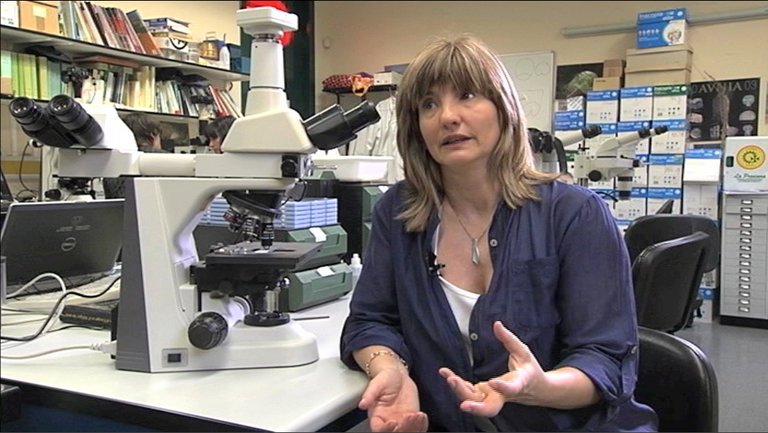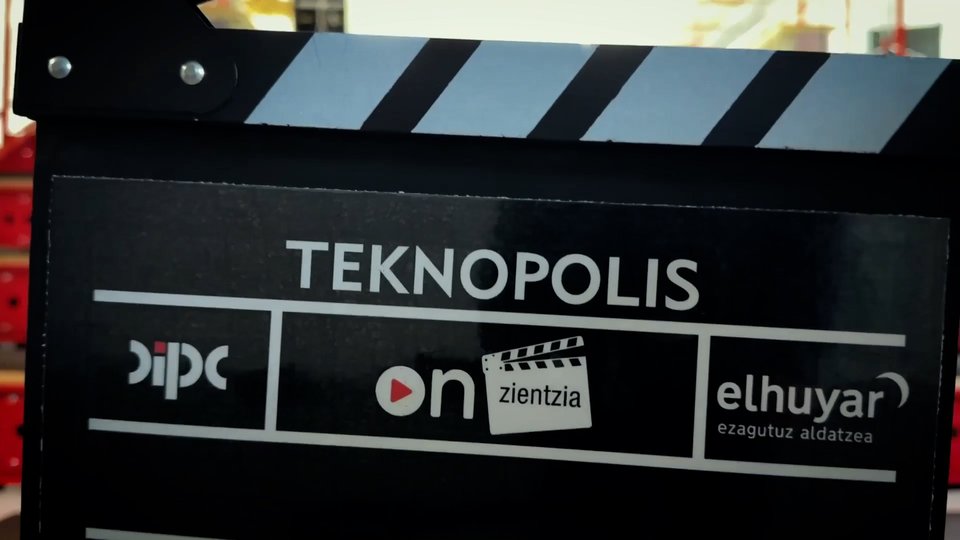Assisted by María José Iriarte
Ikerbasque is a research professor working in the prehistory department of the University of the Basque Country.

Hello, I am Maria Jose Iriarte, Ikerbasque research professor and I work in the Prehistory Department of the University of the Basque Country.
Truth be told, ever since I was a child, when I was asked what I wanted to be when I grew up, I answered that I wanted to be a doctor. And that's what I'm focusing all my studies on. But, due to some circumstances, due to the late start of the medical course, I began to study history. When I was completely impressed with prehistoric issues and was told that I had a place to study medicine, “No! I’m stuck with history!” he replied, and that’s how I started.
My research is based on the study of fossil pollen, called Paleopalinology. The pollen is
perfectly preserved in the sediments, despite the fact that it is an organic element. Thanks to this, even after 200 or 300000 years, we can study it. How is it done? Well, through comparisons. That is, we study mainly Quaternary pollen, and since the species we have today are also Quaternary, we have references to how plant species worked in the past. On the other hand, for example, the
pollen contained in the current hazelnut is very similar to the pollen of the hazelnuts 40,000 years ago. So from this comparison we can analyze what vegetation we had in the past. Knowing this, we infer paleoclimatic information.
What needs to be considered with pollen are the different types of pollination. That is, it is not the same as 10% pine pollen or 10% elm pollen, for example. If the distribution of pollen used by
a particular species is by wind, it is a random system (pollen is spread by wind and may or may not reach a plant), then the plant will have to produce much more pollen compared to other types of pollination. In insect pollination fertilization fertilization is much more certain; the bee that has stopped in a certain flower will then turn to another flower. The system is less random and the pollen production of this plant will be lower.
In carrying out research and interpretation, we do not attach the same importance to a high percentage of a species such as pine and to another species with less production, since the latter has a higher value.
Paleobotanikatik lortzen ditugun datuei esker, faunak ematen dizkigun datuei esker, ikerketa-sedimentologikoek ematen dizkiguten datuei esker, ondorioztatu dezakegu iraganeko klima-aldaketak ez zirela uste dugun bezain egonkorrak. For example, we used to be told when I was a student that it was very cold all over the glacier of the era. But today, we know that wasn’t the case. There were numerous fluctuations, and theoretically within a few years, 1000-1500 years, there were significant climatic changes.
Humans have had a huge impact on the landscape. In line with the transformation into a producer, there were major changes in the environment. There came the appearance of the external species, the alloctonic species. And the landscape that we have today, although we feel that it is entirely ours, is a consequence of the previous changes. For example, the beech; although it seems to be eternal in our landscapes, like the beech forests of Irati, it is a reflection of a phenomenon that is being studied in the Pyrenees. That is, from the Bronze Age onwards, there was a great process of deforestation, and then the beech took advantage of the disappearance of those previous trees to expand. It had existed until then, but it was dominated by other kaduzifolios trees, such as fir trees. At a certain point, there was a change. For this reason, the landscape we have today, the environment, is conditioned by previous events, as well as prehistoric events.
In the case of archaeology, people are interested. He likes it, he asks questions, when we are digging, wherever he is, he comes to see it, to ask it, to cuss... So yes, if there is interest. It is true, of course, that some issues are of more interest than others. But in general, people like it.
I think I'm lucky because there's nothing better than dedicating yourself to something that you like. I like both field work and laboratory work. But above all, the “surprise” factor that research brings, this ability to create surprise is what I really like.
What's bothering me is bureaucratic work. Because of all the pages and data to fill out, you end up looking almost completely economical. But you have to get used to it, too.
Buletina
Bidali zure helbide elektronikoa eta jaso asteroko buletina zure sarrera-ontzian








